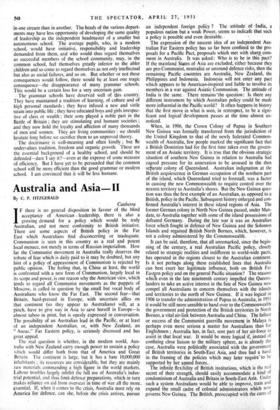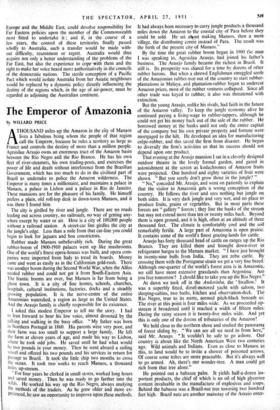Australia and Asia II
By C. P. FITZGERALD
Canberra IF there is no general disposition in favour of the blind acceptance of American . leadership, there is also a growing demand for a policy which would be truly Australian, and not mere conformity to British initiative. There are some aspects of British policy in the Far East which Australians find disconcerting or inadequate. Communism is seen in this country as a real and potent local menace, not merely in terms of Russian imperialism. How far the Communist movement in Australia really deserves the tribute of fear which is daily paid to it may be doubted, but any hint of a policy of appeasement of Communism is rejected by public opinion. The feeling that. i China at least, the world is confronted with a new form of Cbmmunism, largely local in its scope and power, is one reason why the American view, which tends to regard all Communist movements as the puppets of Moscow, is called in question by tbo small but vocal body of Australians who know the Far East. The second fear—that Britain, hard-pressed in Europe, with uncertain allies on that continent (so they appear to Australians) will, at a pinch, have to give way in Asia to save herself in Europe—is almost taboo in print, but is openly expressed in conversation. The possibility of an Australian lead in the Pacific, or at least of an independent Australian, or, with New Zealand, an Anzac." Far Eastern policy, is seriously discussed and has great appeal.
The real question is whether, in the modern world, Aus- tralia with New Zealand carry enough power to sustain a policy which would differ both from that of America and Great Britain. The continent is large, but it has a bare 10,000,000 inhabitants ; its resources are considerable, but they are mainly raw materials commanding a high figure in the world markets. Labour troubles largely inhibit the full use of Australia's indus- trial potential, and thus limit defence preparation, which in turn makes reliance on aid from overseas in time of war all the more_ essential. If, when it comes to the crisis, Australia must rely on America for defence, can she, before the crisis arrives, pursue an independent foreign -policy ? The attitude of 'India, a populous nation but a weak Power, seems to indicate that such a policy is possible and even desirable.
The expression of the nascent idea of an independent Aus- tralian Far Eastern policy has so far been confined to the pro- posals for a Pacific Pact, proposals which met with sharp. com- ment in Australia. It was asked: Who is to be in this pact? If the mainland States of Asia are excluded, either because they are pro-Communist, neutralist or unsound defence risks, then the remaining Pacific countries are Australia, New Zealand, the Philippines and Indonesia. Indonesia will not enter any pact which appears to be American-inspired and liable to involve its members in a war against Asiatic Communism. The attitude of India is the same. There remains'the question: Is there any different instrument by which -Australian policy could be made more influential in the Pacific world? It often happens in history that the first move in what is seen, in retrospect, to be a signi- ficant and logical development passes at the time. almost un- noticed.
When, in 1906, the Crown Colony of Papua in Southern New Guinea was formally transferred from the jurisdiction of the United Kingdom to that of the newly federated Common- wealth of Australia, few people marked the significant fact that a British Dominion had for the first time taken over the govern. ment of an Asiatic territory. It is true that the obvious strategic situation of southern New Guinea in relation to Australia had cased pressure for its annexation to be aroused in the then seiarate colony of Queensland. Australian indignation at the British acquiescence in German occupation of the northern part of the island, which Queensland tried to forestall, was a factor in causing the new Commonwealth to require control over the nearest territory to Australia's shores. But the New Guinea ques- tion was thus the first example of an Australian, as opposed to a British, policy in the Pacific. Subsequent history enlarged and con- firmed Australia's interest in these island regions of Asia. The former German colony in North New Guinea passed, under Man- date, to Australia together with some of the island possessions of defeated Germany. During the.late war it was an Australian force which fought in' defence of New Guinea and the Solomon Islands and regained British North Borneo, which,. however, is not a colony administered by the Commonwealth. - It can be said, therefore, that all unremarked, since the begin- ning of the century, a real Australian Pacific policy, closely related to strategic realities and indifferent to world-wide pacts, has operated in the regions closest to the Australian continent. Is it not perhaps along these established lines that Australia can best exert her legitimate influence, both on British Far Eastern policy and on the general Pacific situation? The reasons which even in the late nineteenth century impelled the Queens- landers to take an active interest in the fate of New Guinea now compel all Australians to concern themselves with the islands and territories to the north of New Guinea. if it was-logical in 1906 to transfer the administration of Papua to Australia, in 1951 it would be still more sensible to hand over to the Commonwealth the government and protection of the British territories in North Borneo, a vital air-link between Australia and China. The failure or success of the Communist guerrilla movement in Malaya is perhaps even more serious a matter. for Australians than for Englishmen ; Australia has, in fact, sent part of her air-force to assist in that local war. It would be more logical if, instead of confining close liaison to the military sphere, as is already the case, Australia were politically associated with the government of British territories in South-East Asia, and thus had a hand in the framing of the policies which may later require- to be supported by her actned forces.. The infinite flexibility of British institutions, which is the real secret of their strength, should easily accommodate a kind of condominium of Australia and Britain in South-East Asia. Under such a system Australians would be able to improve, train and expand the small cadre of colonial administrators which now governs New Guinea. The British, preoccupied with the cares of Europe and the Middle East, could devolve responsibility for Far Eastern policies upon the member of the Commonwealth most fitted to undertake it ; and if, in the course of a few years. the control of these territories finally passed wholly to Australia, such a transfer would be made with- out difficulty, resentment or regret. Australia would thus acquire not only a better understanding of the' problems of the Far East, but also the experience to cope 'with them and the right to make her voice heard more authoritatively in the councils of the democratic nations. The sterile conception of a Pacific Pact which would isolate Australia from her Asiatic neighbours would be replaced by a dynamic policy directly influencing the destiny of the regions which, in the age of air-power, must be regarded as adjoining the Australian continent.



































 Previous page
Previous page